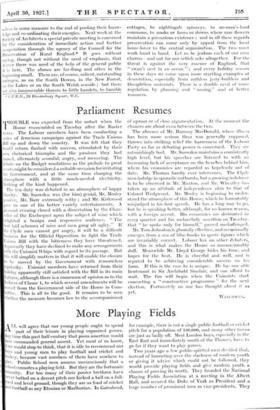Parliament Resumes
TROUBLE was expected from the outset when the I House reassembled on Tuesday after the Easter recess. The Labour members have been conducting a series of ferocious campaigns against the Trade Unions Bill up and down the country. It was felt that they would return flushed with success, stimulated by their own rhetorical triumphs and the passions they had roused, alternately scornful, angry, and menacing. The debate on the Budget resolutions as the prelude to great events might be considered a suitable occasion for irritating the Government, and at the same time charging the atmosphere with a little much-needed electricity. Nothing of the kind happened.
The tea duty was debated in an atmosphere of happy hilarity. Mr. Snowden was (for him) genial, Mr. Mosley pensive, Mr. Barr extremely witty ; and Mr. Kirkwood gave us one of his better variety entertainments. A pleasant evening closed with a dissertation by the Chan- cellor of the Exchequer upon the subject of wine which delighted a benign and responsive audience. "The best laid schemes of mice and men gang aft agley." If the Clyde men cannot get angry, it will be a difficult business for the Official Opposition to fight the Trade Unions Bill with the bitterness they have threatened. Apparently they have declined to make any arrangements with the Unionist Whips with regard to its passage. But this will simplify matters in that it will enable the closure 0 be moved by the Government with remorseless regularity. Unionist members have returned from their holiday apparently still satisfied with the Bill in its main eatttres, although there is a consensus of opinion as to the )adness of Clause 1, to which several amendments will be 'mired from the Government side of the House in Com- mittee. This is all to the good. It remains to be seen rhether the measure becomes law to the accompaniment of uproar or of close argumentation. At the moment the chances are about even between the two.
The absence of Mr. Ramsay MacDonald, whose illness has been more serious than was generally supposed, throws into striking relief the barrenness of the Labour Party so far as debating power is concerned. They are astonishingly bad. Mr. Snowden maintains a consistently high level, but his speeches are listened to with an increasing lack of acceptance on the benches behind him, where his economics arc regarded as hopelessly out of date. Mr. Thomas hardly ever intervenes. The Clyde men indulge in sporadic outbursts, but a growing indolence is to be observed in Mr. Maxton, and Mr. Wheatley, has taken up an attitude of independence akin to that of Colonel Wedgwood. Mr. Mosley is beginning to under- stand the atmosphere of this House, which he lamentably misjudged in his first speech. He has a long way to go, but he is speaking better, although, for no known reason, with a foreign accent. His economics arc distrusted in every quarter and his melancholy assertion on Tuesday, that " he spoke only for himself," passed unchallenged.
Mr. Toni Johnston is gloomily effective, and occasionally emerges from a sea of blue-books to quote figures which arc invariably correct. Labour has no other debaters, and this is what makes the House so unconscionably dull. Meanwhile Mr. Lloyd George bides his time, and hopes for the best. He is cheerful and well, and is reputed to be achieving considerable success on his farm. If this is the ease he is unique. He has one able lieutenant in Sir Archibald Sinclair, and can afford to wait. The fun will begin when the Unionists start concocting a " constructive programme " for the next election. Fortunately no one has thought about it as yet.
WATctIMAN.










































 Previous page
Previous page